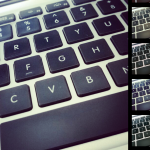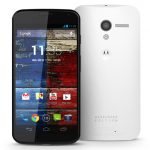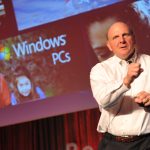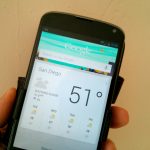My favorite tech products of 2014 [Joe]

Looking back on this last day of the year, I wonder how my daily tech changed so much since the first. On Jan. 1, 2014, my core computing comprised Chromebook, Nexus tablet, and Nexus smartphone. Midyear, I switched out to all Microsoft—buying Surface Pro 3 and Nokia Lumia Icon. While commendable the effort, Windows poorly fit my lifestyle. Today, I'm all Apple—13-inch MacBook Pro Retina Display with 512GB SSD, iPhone 6 128GB, and iPad Air 128GB. I can't imagine using anything else.
Following the lead of my BetaNews colleagues Mihaita Bamburic, Ian Barker, Alan Buckingham, Brian Fagioli, and Wayne Williams, I review my year in tech, and unlike 2013 focus on products that released during the year. I present my 2014 personal tech alphabetically, from company name, rather than order of importance—because they all matter. Note: While the list looks like four, it's five because the first is two combined.
Your personal porn is public

The Internet is buzzing about celebrity nude photos pilfered from iCloud. The problem is bigger than Apple's security, if breached, which I doubt. Behavior is the larger concern, and how people adapt during the contextual cloud computing era. If your phone automatically syncs pictures or videos to any cloud service -- Google Photos, iCloud, OneDrive, or another -- you must assume that nothing is private.
That personal nude video you shoot on the HandyCam is very different from the one taken on Galaxy S5, iPhone 5s, or another device. I should be stating the obvious, but given pervasive attitudes about the Internet -- where people feel safe browsing in the sanctity of their domicile or WiFi coffee shop -- carelessness must be the presumption. These leaked celeb nudes, if real rather than Photoshopped, are good example. Simple rule: Don't shoot any photos or videos on a cloud-connected device you don't want everyone to see.
I am Microsoft All-In

Sixth in a series. On July 1, I officially started my "Microsoft All-In" summer sojourn. Surface Pro 3 is my PC and Nokia Lumia Icon my smartphone for the next couple of months. Google gets the boot -- at least for awhile. I now largely use Microsoft products and services and third-party apps available for the company's platforms. Many commenters wonder why, so let me explain.
I last used Windows as my primary platform in 2010 -- never for Windows Phone. Like other BetaNews reporters, I tend to write about products used regularly. Writing is more authoritative from experience, and often only long-time use reveals hidden problems or benefits. The reality, and it's something obviously seen in comments: Microsoft platform users largely make up BetaNews readership.
My two years with Chromebook
Colleague Alan Buckingham is on a summer sojourn using HP Chromebook 11. I took similar journey during August and September 2011, but the Samsung Series 3 Chromebook -- much as I liked the overall user experience -- couldn't satisfy my needs. In May 2012, with Samsung Chromebook Series 5 550's release, all changed. I started down a permanent path, looking back once for a few weeks. I am a Chromebook convert and eagerly watch to see where Alan will be when the summer sun fades to autumn colors.
"Can I use Chromebook as my primary PC?" It's a question I see often across the Interwebs. The answer is different: You can use Chromebook as your only computer. The only PCs in my home are Chromebooks. There are no Macs or Windows machines doing double duty. Chromebook is more than good enough. Most people will be surprised just how satisfying Chromebook can be -- and how affordable. For 96 cents more than the cost of one entry-level MacBook Air, you can buy from Amazon four HP Chromebook 11s -- the model Alan uses now. User benefits are surprisingly similar.
I gave up the Ghost

I spent time with the Ghost blogging platform today. I am intrigued by the visuals and promised simplicity. But I don't see the latter. At this stage, I just see complexity. Yet the whole premise is stripping back to basic blogging, rather than managing content as WordPress increasingly demands.
This month I put up a website for my personal independent publishing brand, and there are few posts, making it a good test case for migration. I easily used the WordPress plugin for exporting posts in Ghost format and imported them just fine. But I see too much trouble adapting themes, most of which look fabulous, BTW, or prepping other basic features.
Chromebook belongs to computing's past, not its future
Early this evening, I exchanged emails with someone writing a blog post about Chromebook. He seeks sales numbers that I doubt are available. Success is a difficult measure despite the hype. In January post "The trouble with new Chromebooks" here and "Twenty-Fourteen isn't Year of the Chromebook" on my personal site, I raise questions about the computer's future.
I extend reservations in the text of my email reply, which follows.
Google's Motorola sale is more about Nest than Samsung

Like lots of other people, overnight I pondered Google's surprise sale of Motorola to Lenovo. The timing sure seems odd. Conspiracy theories abound. Among tech bloggers, Samsung ranks as top reason, given the timing, just days after the American and South Korean companies cut a lofty cross-patent deal that also turns way down the extent of Android customization. Certainly the latter agreement is important to Google, for reasons I laid out two years ago in post "Google has lost control of Android".
Some conspiracy theorists contend that Google always planned to sell Motorola and rebuilt the brand only to gain leverage against Samsung, which arguably exercises more direct influence over Android than does Google -- at least from a user experience perspective. But I disagree. The Motorola unloading is a lot more about the search and information giant's acquisition of Nest than anything Samsung does. My reasoning follows.
13 things for which Google gives thanks

U.S. Thanksgiving Day comes late this year for retailers, but makes more time for Google to count its blessings and to offer gratitude for them. Oh, they are bountiful, and there is still another month of them to come. The year 2013 will be remembered as one of the finest in Google history. The company has so much to be thankful for, I could have trebled the list.
But for succinctness, I whittle down to those things that mean more than others or that otherwise would be overlooked in the typical yearly review. The list goes from that for which Google should be least thankful to most. Gobble. Gobble.
Windows Phone app 6tag gets regramming, nearby posts and other features

Developer Rudy Huyn has steadily improved his popular 6tag Windows Phone 8 app up to the point where an official Instagram client would struggle to compete with the former's feature set. The app has received frequent updates since its release, the latest of which just arrived sporting a couple of major new features.
Using geolocation, 6tag, which reached version 1.5, can now display a list of posts created in nearby locations. Users can select the covered distance (presumably the radius) through a slider -- the default value is two kilometers -- and see a map with the places where fellow Instagrammers have created the nearby posts.
Would you pay $650 for Moto X Developer Edition?

I just have to ask, because the price irks me.
Late this afternoon, Guy Kawasaki, Motorola's chief evangelist, posted to Google+ that Moto X "Developer Edition now available". I've been waiting for this, being on T-Mobile, which doesn't directly sell the handset. But the phone isn't available for me, or likely you. Verizon model is $649.99. GSM X is "coming soon", presumably for same price. While the phone packs an "unlockable bootloader" and is contract-free, price busts my budget, particularly considering one major benefit -- personalized appearance -- isn't available.
If Microsoft is diseased, will cutting out Steve Ballmer like a cancer save the patient?

Emergency surgery is the appropriate analogy for the firing of the iconic CEO. Yes firing. Microsoft announced Steve Ballmer's departure today, quite unexpectedly, and in his own words "within the next 12 months, after a successor is chosen". Meaning: Soon as there is a replacement, he is gone. Vamoose. Adios. We'll send Christmas cards. Not!
Unless Ballmer is in ill-health, or something bad happened to someone he loves, he wouldn't just walk away whistling to the wind. The man is too passionate about Microsoft. There is but one interpretation: The board of directors gave Ballmer his pink slip.
10 things a Windows Phone 8 user misses about Android

Adopting Windows Phone 8, and ditching Android, was one of the most daring decisions that I have ever made in my entire tech life. I am the sort of person who does not warm up to major changes (not my strong suit), especially ones that involve transitioning between two polarizing mobile platforms. But, surprisingly, I gave up the flexibility and versatility of the green droid operating system for the glanceable information and simplicity of Windows Phone. Admittedly, it was not smooth sailing from day one.
The problem is that, in order to fully adjust to the change, something has got to give, namely features that I consider to be essential for a modern-day smartphone operating system. For some they may not matter as much, but others -- like me, and maybe you -- are likely to be left wanting for more. And, no, I am not talking about widgets, themes, root or Instagram (it, however, seems to be the tech media's favorite blaming toy even though there are good third-party alternatives), but rather more down-to-earth, mundane ones.
Gartner says the PC has no future

Today, Gartner offers grim prognostications for the PC's future, which is not surprising. That the analyst firm took so long disturbs and reveals much about how all these consultants seek to preserve client contracts before anything else. I've warned for years that connected-devices would diminish the personal computer's relevance, much like the mainframe's decline three decades ago. The PC era is over, as I asserted here 26 months ago. On Halloween 2008, I asked in a Microsoft Watch post: "Will your next PC be a smartphone?" What took Gartner so long? The "new device religion" analysis still misses the mark, too.
Following IDC's lead, Gartner now combines PCs, smartphones and tablets into a single forecast. By that measure, in 2012, Android worldwide device shipments (497 million) exceeded Windows (346.5 million) and will more than double (to 1.07 billion) by 2014. Analysts warn the operating system that defined the PC era will struggle with Apple iOS and OS X to be the second dominant platform. By many measures, the circumstance looks grim for Microsoft and Windows, and that's already the popular sentiment today among blog posts and news stories about Gartner's forecast. Don't believe them.
Google Now for Chrome changes EVERYTHING

François Beaufort, the developer who recently made headlines by outing Chromebook Pixel, is stirring up things again. He uncovered code that all but assures Google Now will soon come to Chrome and Chrome OS. I can't overstate how enormously game-changing the service will be. Google Now is the purest evolution of sync and the killer app for the contextual cloud computing era.
We are on the cusp of Star Trek computing, where information is available at the command of your voice and the machine is a personal assistant that anticipates you. Google Now delivers a hint of this future on Android devices. Bringing it to PCs puts the search and information giant ahead of everyone because, with the exception of a possible future Microsoft-Facebook partnership, no other company has the resources to provide so much personalized information to so many people in so many places in so many ways.
Believe it, smartphones and tablets make people use PCs less

What a difference three years make. In April 2010 I asked "Will iPad cannibalize Mac sales?" and a month later PC sales. Fast-forward 12 months, NPD answered a definitive "No". I disagreed: "Call me cynical and skeptical, but I'm convinced that changing behavior will cause many smartphone buyers, and many more tablet adopters, to delay PC upgrades".
Today, NPD sees things a little differently, based on fresh survey data that puts context behind two years of declining PC sales -- that despite Windows 8's release little more than three months ago. The firm finds that 37 percent of US consumers now access content on smartphones or tablets they used to on PCs. Changing behavior like this affects computer sales, as consumers shift behavior and delay PC upgrades or don't buy ever.
Recent Headlines
Most Commented Stories
© 1998-2025 BetaNews, Inc. All Rights Reserved. About Us - Privacy Policy - Cookie Policy - Sitemap.